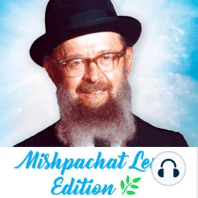511 min listen
Parshas Tzav – A Life of Service
FromToras Avigdor
ratings:
Length:
1,164 minutes
Released:
Mar 24, 2019
Format:
Podcast episode
Description
Part I.Torah of KohanimEVERYONE IS JEALOUS OF RABBI MILLERInParshas Tzavwe continue our encounter with theavodahof thekohanim, the ones privileged to stand in the service of Hashem in the Beis Hamikdash. And we find ourselves inundated with the especial attention given tokohanim. Laws upon laws for the descendants of Aharon that place them on a pedestal; rules meant to regulate the behavior of the aristocracy. Now, I don’t want to make you uncomfortable or jealous of me [The Rav was a kohen], but week after week, inVayikra, Tzav, Shmini, and actually in most ofSefer Vayikra,we become more and more impressed with the great honor and privilege accorded to thekohanim.I know that most of us here have already accepted the maxim of democracy, equality for everyone, so you don’t want to think too much about it, but the truth is when theBnei Leviwere chosen to be theKohanei Hashem, it was a great pride for them. Thekohenwalked with a swagger; he was on top of the world! It wasn’t just a matter of being called to officiate at apidyon habenor to benefit from theterumosand othermatnos kehunah.It was a great prerogative, a great privilege, to be the servant of Hashem in His house. And I have no doubt that the rest of theAm Yisroelwere disappointed and jealous. Thebechorim,who had lost this privilege, surely were jealous, but I’m sure thateveryonelooked at thekohanimwith envy.TRESPASSING ON HOLY GROUNDSTo be akohenwas an eternal privilege of closeness to Hashem. והיו לי הלויים – “And the Levites shall be Mine” (Bamidbar 3:12); and when Hashem says “Mine”, you have to know, He means “Mineforever.” Themedrashsays that. “Wherever it says לי, ‘Mine’, it’s for all time; in this world and in the World to Come” (Vayikra Rabbah 2:2). And therefore, to be chosen askohanimby Hashem “To be Mine” was the greatest of honors; an honor for eternity, that most of the Am Yisroel could only pine for.And therefore, as we make our way throughSefer Vayikra,we understand that we are treading on holy ground. We are being taken on a tour of sorts through the Beis Hamikdash and theavodashakorbanos, and we feel as if we don’t belong. We have stepped over the boundary into a world ofkehunah, a world ofkedushah, and we tiptoe throughparshiyosVayikra,TzavandSheminias if trespassing on forbidden grounds.And then, as we tiptoe through the Mikdash feeling out of place and alienated from all of these priestly laws, suddenly we bump our heads against something we weren’t expecting. And it’s a curious thing. Right in the middle of the laws ofkohanimand theirkorbanos, we chance upon apossukthat veers from the topic, words that are directed at all of theAm Yisroel.כל חלב שור וכשב ועז לא תאכלו – “Any fat of oxen, sheep, or goats, you shall not eat”(Tzav 7:23). It’s apossukthat’s telling us aboutchullin, ordinary meat, eaten in our own homes.MISPLACEDPESSUKIM?The Torah here, in aparshadedicated to thekohanim, is talking toLevi’imandYisraelimas well; men, women and children; anyone of theAm Yisroel. And we are told that we are forbidden to eat thecheilev, a certain type of fat, from these animals. And that’s a question; what’schullin, ordinary meat, doing here inVayikra, theToras Kohanim? Why are we discussing our home kitchens inParshas Tzav?Now actually if we study the end of thepossuk, we find that the Torah provides us with a clue: כי כל אכל חלב מן הבהמה אשר יקריב ממנה אשה להשם ונכרתה הנפש האוכלת מעמיה – “For anyone who eats the fat of an animal speciesfrom which one may bring a fire-offering to Hashem, the soul of the one that eats shall be cut off from its people” (Ibid. 7:23-25). So we see that the Torah adds a few words here: אשר יקריב ממנה, only the fats of animals that could be used as offerings are forbidden. A lamb, a calf, itcouldbe brought on themizbeiach, so itscheilevisossur. But it’s forbidden even if it’snotakorban!Now, at first glance, this reasoning is a bit difficult to understand. Just because thekohenworking in the Mikdash was once required to remove the f
Released:
Mar 24, 2019
Format:
Podcast episode
Titles in the series (100)
Parshas Mishpatim – Preface to Chassidus by Toras Avigdor
